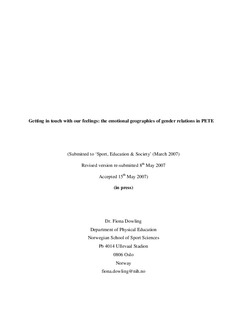Getting in touch with our feelings: the emotional geographies of gender relations in PETE
Peer reviewed, Journal article
Permanent lenke
http://hdl.handle.net/11250/170451Utgivelsesdato
2008-08-01Metadata
Vis full innførselSamlinger
- Artikler / Articles [2119]
Originalversjon
Sport, Education and Society. 2008, 13(3), 247-266Sammendrag
This paper attempts to illustrate how embodied ways of knowing may enhance our theoretical understanding within the field of physical education teacher education (PETE). It seeks to illustrate how teacher educators' viewpoints and understanding of gender relations are inevitably linked to socially constructed webs of emotions, as much as to intellectual rationales. Indeed, the paper argues for the need for PETE research to transcend the dualistic divide of reason/emotion.
It builds upon interview data from an investigation interested in illuminating the ways in which teacher educators develop their professional identities, using the lenses of gender equal opportunities and equity to examine the degree to which identities reflect 'managerial' or 'democratic' professional projects. In particular it analyses the way in which 'gender talk' seems to evoke strong emotional reactions, often 'negative' feelings, while at the same time, gender equity concerns remain on the periphery of the discipline, despite increasing research evidence which reveals damaging discriminatory learning environments. By using Hargreaves (2000) concept of 'emotional geographies' the paper contends that 'negative emotions' about gender issues are currently hegemonic on account of today's configurations of human relations in PETE, because the discipline's feeling rules construct 'negative feelings' as being reasonable. Acknowledging that professional identities are on-going projects, and that feeling rules can be re-configured, the paper also seeks to illustrate how competing emotions may in the future lead to gender equality assuming a new role in PETE's 'regimes of truths'.
